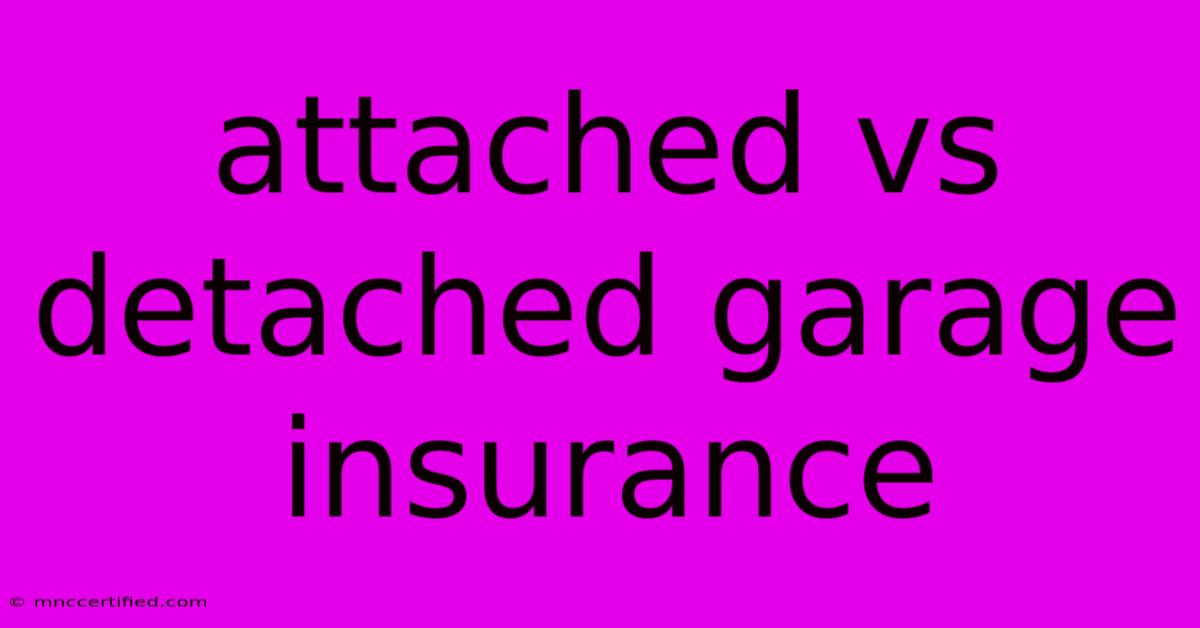Attached Vs Detached Garage Insurance

Table of Contents
Attached vs. Detached Garage: Understanding Your Insurance Coverage
Your garage is more than just a place to park your car. It can be a workshop, storage space, or even a hangout area. But when it comes to insurance, the location of your garage – attached or detached – can significantly impact your coverage.
What's the Difference?
- Attached Garages: Directly connected to your home, sharing a common wall.
- Detached Garages: Separate structures on your property, often located a short distance from the house.
While both types offer valuable storage space, their insurance implications differ considerably. Here's a breakdown of key factors:
Coverage for Attached Garages
Attached garages are typically covered under your homeowners insurance policy. This means:
- Structure Coverage: Damage to the garage itself, including walls, roof, and foundation, is covered up to your policy limits.
- Contents Coverage: Your belongings inside the garage, such as tools, equipment, and vehicles, are generally covered as well.
However, there are important considerations:
- Deductible: You'll need to pay your deductible before insurance kicks in.
- Exclusions: Some items may not be fully covered, such as high-value collectibles or business inventory.
- Liability Coverage: Your policy provides liability coverage if someone is injured on your property.
Coverage for Detached Garages
Detached garages often require separate insurance coverage. This is because they are considered outbuildings and may not be fully protected under your homeowners policy.
Here's what you need to know:
- Outbuilding Coverage: Most homeowners insurance policies offer limited outbuilding coverage. This usually includes a specific dollar limit for structural damage and contents.
- Additional Coverage: You may need to purchase additional coverage to protect your detached garage fully. This could include:
- Extended Coverage: Increasing your policy's outbuilding limit for higher value items or structures.
- Scheduled Coverage: Specifically insuring individual valuable items like tools or vehicles stored inside.
- Liability Coverage: Similar to attached garages, liability coverage protects you from claims if someone gets injured on your property.
Important Note: If you use your garage for business purposes, you'll need commercial insurance, regardless of whether it's attached or detached.
Key Considerations for Choosing the Right Coverage
- Value of your garage and its contents: Determine the cost to rebuild your garage and the value of your belongings inside.
- Usage and location: Consider the purpose of your garage and its proximity to your home.
- Local building codes: Check local regulations that may impact your coverage.
Consult your insurance agent: Discuss your specific needs and get personalized recommendations for the best coverage for your attached or detached garage.
By understanding the nuances of insurance coverage for your garage, you can ensure that you have adequate protection for your property and possessions. Remember, it's always better to be prepared than to regret later!

Thank you for visiting our website wich cover about Attached Vs Detached Garage Insurance. We hope the information provided has been useful to you. Feel free to contact us if you have any questions or need further assistance. See you next time and dont miss to bookmark.
Featured Posts
-
Stephens Annual Investment Conference
Nov 10, 2024
-
Christmas Bonus When Does Dwp Pay
Nov 10, 2024
-
Thousands Demand Christmas Bonus Increase
Nov 10, 2024
-
Pete Wicks Strictlys Most Memorable Routine
Nov 10, 2024
-
Prospect Park Fire Forested Area Scorched
Nov 10, 2024